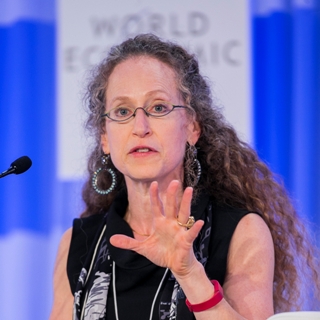Oct 30 2015
The Fourth Industrial Revolution is already upon us and Justine Cassell, associate vice provost for technology strategy and impact and a professor in the Human-Computer Interaction Institute, joined other thought leaders to explore its implications Monday at the World Economic Forum's Summit on the Global Agenda 2015.
 Justine Cassell joined other thought leaders to explore the implications of the Fourth Industrial Revolution at the WEF's Summit on the Global Agenda 2015.
Justine Cassell joined other thought leaders to explore the implications of the Fourth Industrial Revolution at the WEF's Summit on the Global Agenda 2015.
The rapid proliferation of technologies, such as artificial intelligence, biotechnology, nanotechnology, robotics and 3D printing, will have broad and deep impact on all aspects of life, the panelists agreed.
"Every previous industrial revolution has ridden on the backs of those in indentured servitude," Cassell said. "With the Fourth Industrial Revolution, robots are playing the roles that they should be and removing people from roles as servants."
Humankind is moving "from physicality to a data-based world," Cassell observed. This will mean work involving distributed teams, distance employment and the dynamic collection and exchange of data about ourselves. "We will need to train people in an entirely new set of 21st–century skills, which are in fact the oldest skills — communications, collaboration, empathy, respect and how to overcome cultural boundaries."
Other panelists were Bernard Meyerson, chief innovation officer and vice president of IBM; Toomas Hendrik Ilves, president of Estonia; Lee Sang-Yup, director of the Korea Advanced Institute of Science and Technology (KAIST); and Andrew D. Maynard, professor in the School for the Future of Innovation in Society at Arizona State University. Video of the session is available on the World Economic Forum's website.
The Summit on the Global Agenda 2015, meeting in Abu Dhabi, United Arab Emirates, brings together more than 900 thought leaders and experts from business, government, civil society, academia and media who are among the members of the WEF's network of more than 80 Global Agenda Councils.